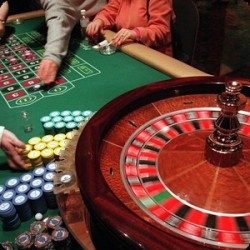A recent study carried out by researchers from USC and the University of Iowa in the USA and the University of Cambridge and University College London in the United Kingdom hinted at new treatment possibilities for gambling addiction. The study appeared in Proceedings of the National Academy of Sciences, a peer-reviewed journal.
According to the researchers, the study tested people’s reaction to “near misses” in slot machines and gambler’s fallacy in roulette. The study used only a small number of people–16 “healthy” people, 17 with damage to the ventromedial prefrontal cortex, 6 with a damaged amygdala, 8 with a damaged insula, and 13 people with damage to other portions of the brain not associated with the vmPFC, insula, or amygdala. The research tracked how these people reacted to wins, “full misses”, and “near misses”. In each test subject, people were allowed to play 90 spins on a computer slot machine, as well as 90 spins on a virtual roulette wheel.
Slot Machine Study
In the case of the slot machine, the game was programmed to offer near-misses, full-misses, and wins. The study showed that baseline (healthy) people were motivated by near-misses to continue playing. People with damage to the insula were less motivated to play after a near-miss, reacting much the same way they did to a full-miss.
Roulette Study
In the case of the roulette wheel, the game was programmed to simulate streaks of red and black wins (red/blue in this case), with the intention of studying the gambler’s fallacy. With gambler’s fallacy, players believe a result which has not occurred recently is more likely to occur soon. So if the ball lands on red 5 times in a row, these players would assume the ball is more likely to land on black on the next spin (though math shows this is not true–thus a fallacy). Baseline players responded to gambler’s fallacy, assuming they could predict the next spin based on past results. In players with a damaged insula, the people did not show classic gambler’s fallacy.
In both case, players were allowed to pick their icon half of the time, while half of the time players were assigned a player icon. When players were given a choice, they responded to questions that they felt they had a better chance of winning. This test measured whether players’ expectations are directed by a feeling of control–clearly, those who felt they had some control over the game (however illusory) were more optimistic about winning.
Finding in the Cambridge Study
The knee-jerk reaction to the research is that the insula part of the brain has something to do with gambling addiction. If so, then a medicine which inhibited the insula might one day be used as a treatment for problem gambling.
It should be noted that this study was limited, and the number of people with damage to the insula was limited (8). Even the number of baseline individuals is small, so a more comprehensive study would need to be conducted to yield more definitive findings. It would be wrong to make too many assumptions based on this research, but it does isolate an area of the brain which should be studied more closely.
What Is the Insula?
The insula is a part of the brain which is associated with feelings and emotional responses, so this is an interesting part of the brain to study for addictive betting. Many people with gaming addiction describe the thrill of winning or the anticipation of playing one more spin (or hand or throw of the dice) to be too much to resist. Their rationality gives way and their emotions take over, which is why self-exclusions list laws exist to allow people to ban themselves from gambling before they get into such an emotion-packed, thrill-seeking moment.
Thus, the insula is a part of the human mental makeup which should be studied. A future study in which problem gamblers are studied to see if this part of their brain is overactive would be useful. If so, then inhibitor drugs for this section of the brain might help people with gambling addiction avoid temptation.
UK Controversy
Unfortunately, when some UK publications ran the story online and in print, their headlines were wildly irresponsible. In one case, The Independent ran with the headline, “The gambler’s fallacy explained? Misguided belief in the big win just around the corner could be down to brain damage”, which implied problem gamblers had brain damage. Those who have read this article understand the findings directly contradicted that statement–the people with damage to their brain showed more rational and healthier decisions when gambling.

